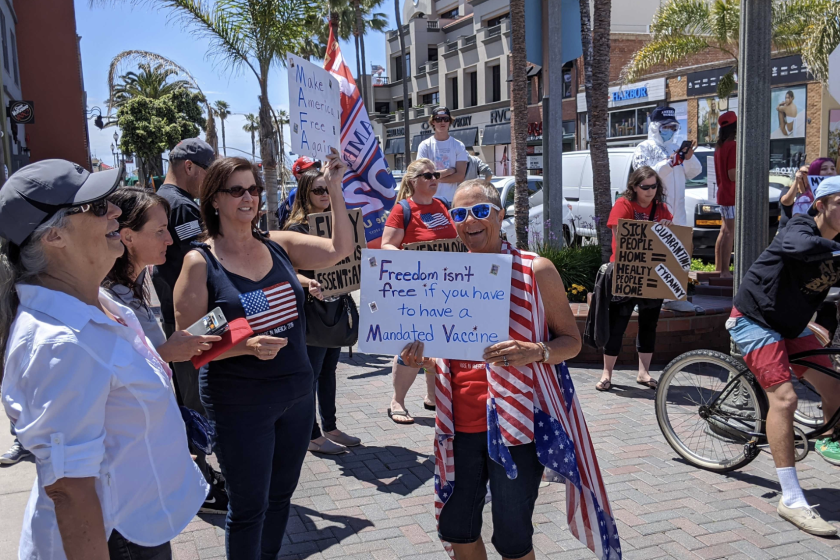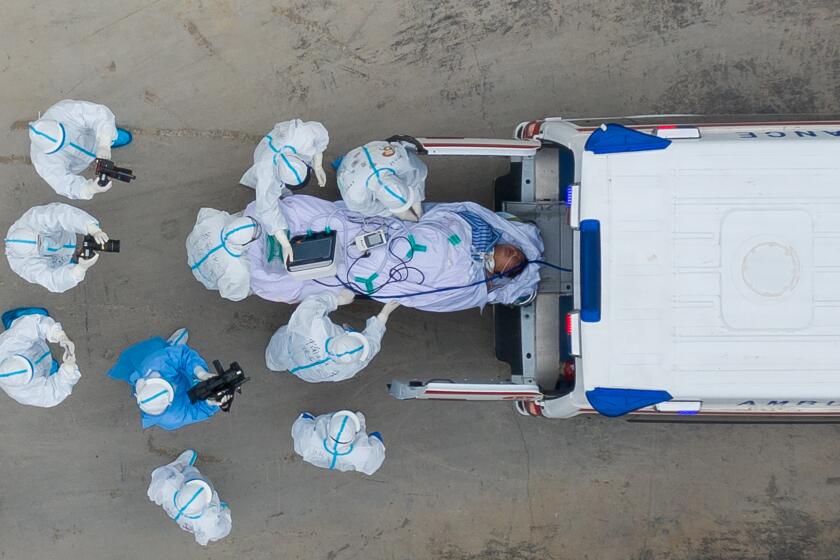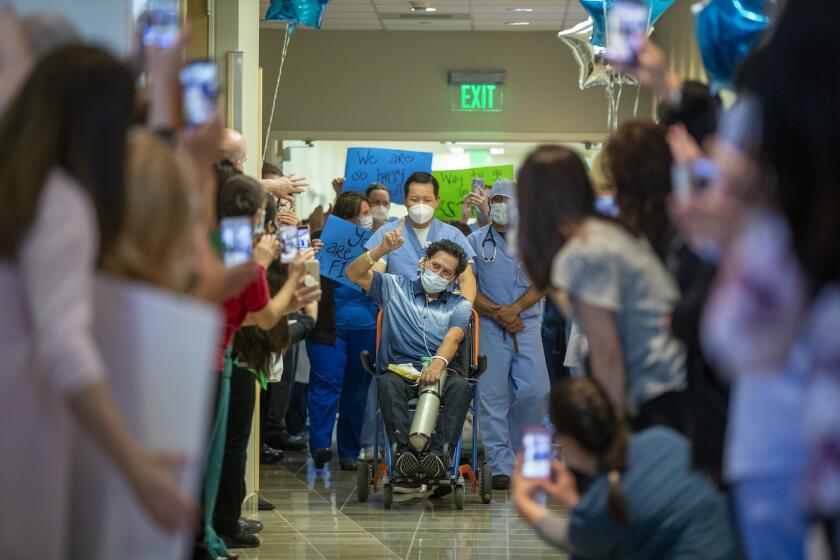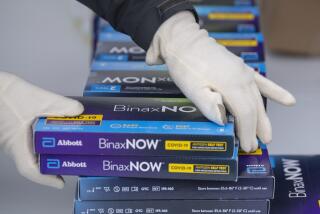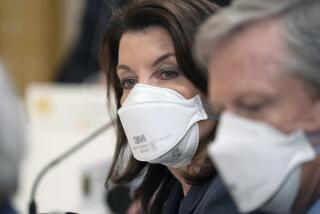‘Delusional’: Governors call out White House on dearth of coronavirus testing as protests grow
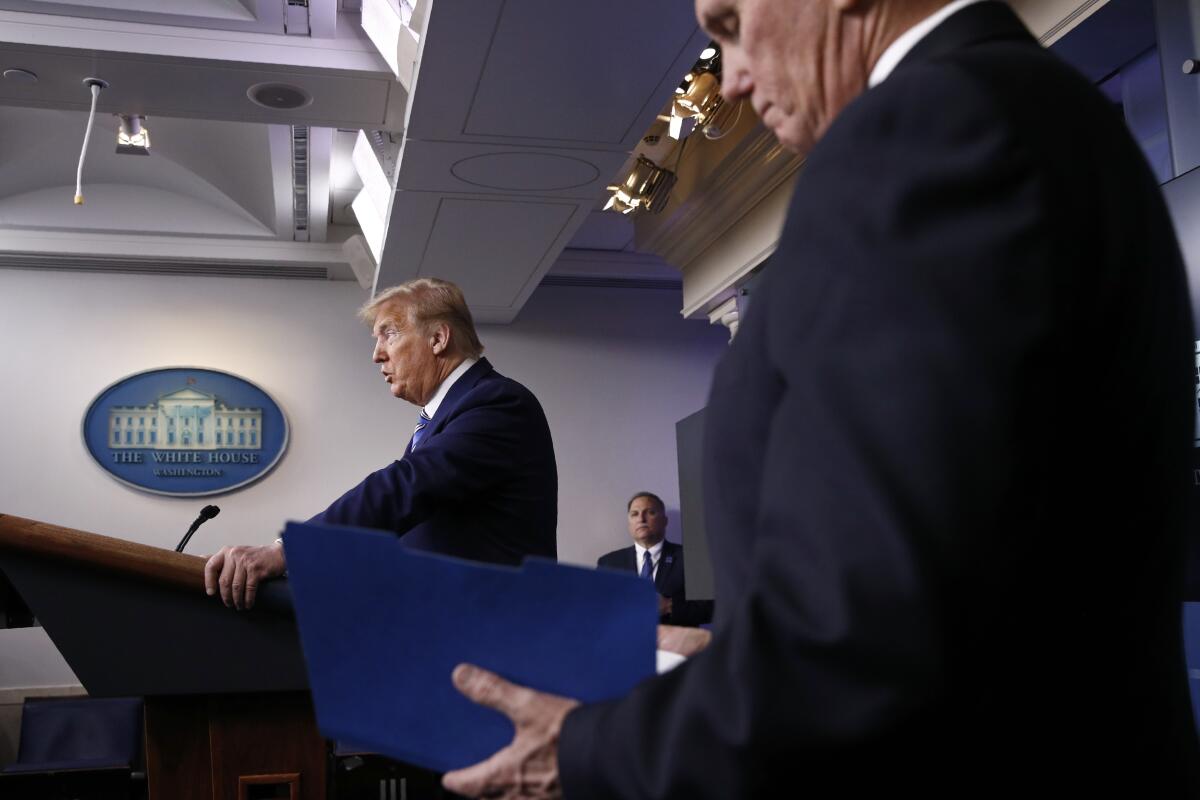
- Share via
As President Trump on Sunday continued to tout the nation’s coronavirus testing capacity, several governors took to the airwaves to vehemently challenge his assessment and to complain that the federal government had been laggardly in providing support for health systems and local economies.
“I am right on testing. Governors must be able to step up and get the job done. We will be with you ALL THE WAY!” the president tweeted Sunday.
Democratic Virginia Gov. Ralph Northam countered Trump, saying it was “delusional” to believe enough testing was in place to move quickly on easing restrictions aimed at slowing the spread of the deadly virus.
“We are fighting a biological war,” Northam said on CNN’s “State of the Union,” adding that governors have been left “to fight that war without the supplies we need.”
“Our president, obviously, has been unable to deliver on tests,” Northam said.
U.S. testing rates for the coronavirus lag behind those of many other countries weathering the pandemic, with several governors and health experts saying the White House has not stepped up to order the production of sufficient supplies of tests, nasal swabs and other necessary materials and has also failed to coordinate a national response.
Trump snapped back Sunday evening, saying at a White House briefing that the country will “have so many swabs you won’t know what to do with.”
Dozens of different antibody blood tests are also now available, but the majority of them have not been approved by the Food and Drug Administration, leading to concerns about the reliability of results.
Trump insisted that the country was ready to open up in pieces “like a beautiful puzzle,” county-by-county, state-by-state as areas report declining new cases of COVID-19, the disease caused by the coronavirus.
But many elected officials say Trump is getting ahead of himself and strongly question his recent tweets that appeared to encourage protests against stay-at-home restrictions his own administration has recommended to prevent spread of the virus.
Asked whether he had any concerns about weekend protests against stay-at-home orders imposed by states, Trump said, “People are allowed to protest.”
He also said he had watched unspecified footage of the gatherings and “they were all six feet apart.”
Images from news reports, however, clearly show protesters clustered together.
On Sunday, at least 2,000 people gathered in Olympia, Wash., some waving American flags or carrying rifles.
“Lock Jay up! Lock Jay up!” they chanted, a reference to Democratic Gov. Jay Inslee, saying he should be imprisoned for undertaking public health measures that had brought the economy to a halt.
Inslee on Sunday disparaged Trump’s tweets on such protests, echoing fellow critics who say the president’s messaging runs counter to the warnings of his own public health experts that large gatherings can further the spread of the coronavirus.
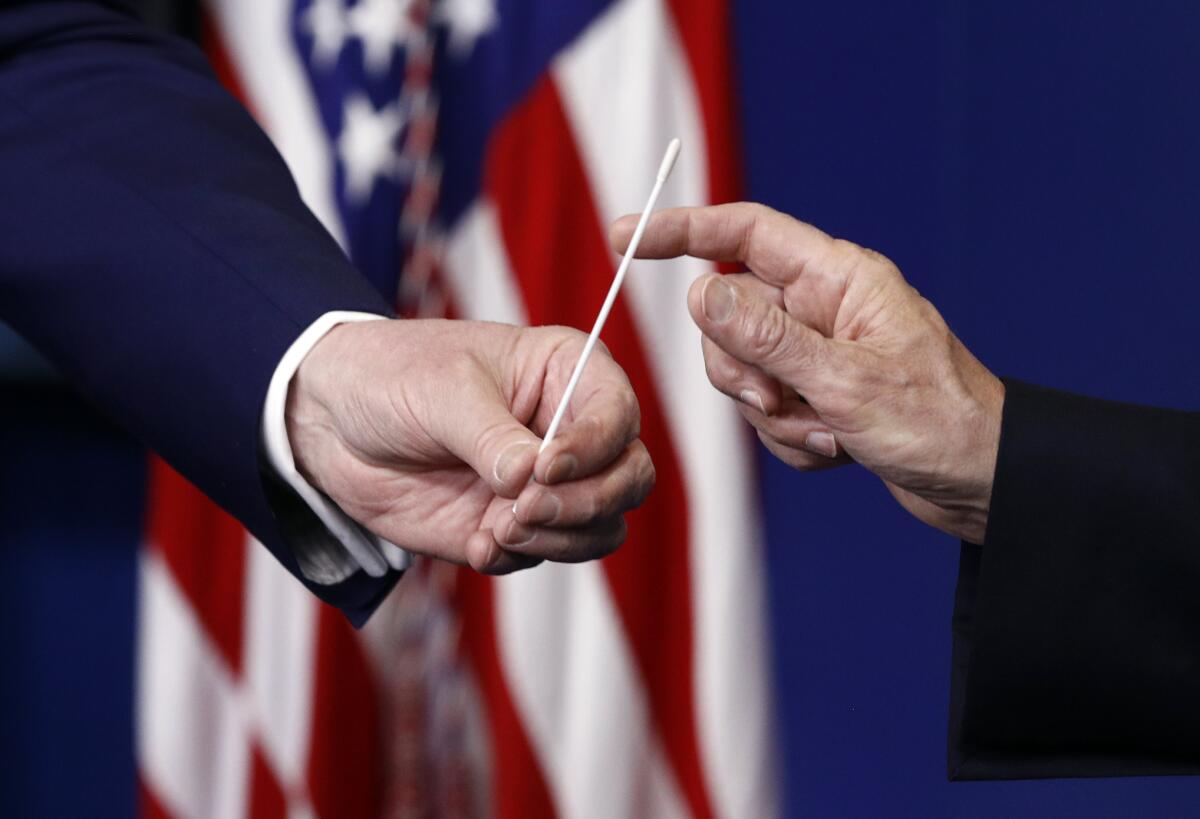
Appearing on ABC’s “This Week,” Inslee said the president’s comments had amounted to fomenting insurrection.
“To have an American president encourage people to violate the law, I can’t remember any time during my time in America where we have seen such a thing,” he said.
Deaths in the U.S. from COVID-19 reached nearly 41,000 on Sunday, according to Johns Hopkins University, as confirmed cases grew past 758,000.
The hardest-hit area of the country, New York, reported its sixth straight day in which hospitalizations from the infection dropped.
Still, Gov. Andrew Cuomo, who has praised the federal government’s recent support of the state, warned against celebrating despite believing New York was past the peak of the outbreak.
“The president is right when he gets up there and says the models had many more people dying,” Cuomo said Sunday, adding that the state will ramp up “aggressive” antibody testing in the coming weeks. “This is a great success story … [but] don’t go backward.”
On NBC’s “Meet the Press,” Vice President Mike Pence suggested states could quickly double their testing capabilities. “We’re doing 150,000 tests a day now,” Pence said. “If states around the country will activate all of the laboratories that are available in their states, we could more than double that overnight.”
But critics have countered that the White House has not made broad use of the Defense Production Act to ensure adequate supplies, and some public health experts have said the country will need to conduct half a million tests a day to ensure a relatively safe wide-scale reopening of the economy.
“I think this is probably the No. 1 problem in America, and has been from the beginning of this crisis — the lack of testing,” Maryland Gov. Larry Hogan, a Republican, said on CNN’s “State of the Union.”
Hogan said he had “repeatedly made this argument to the leaders in Washington on behalf of the rest of the governors in America.”
Some state executives have pointed out that the federal role is crucial in certain aspects of the testing process. Gov. Charlie Baker of Massachusetts, a Republican, said on CBS’ “Face the Nation” that states “shouldn’t be making their own decisions.”
“Everything associated with testing has to be approved by the CDC and the FDA, as it should be,” Baker said on CBS’ “Face the Nation,” referring to the Centers for Disease Control and Prevention and the Food and Drug Administration.
At the White House briefing, Trump suggested that governors were being inconsistent by seeking his administration’s help with testing, implying that the states were asking that the federal government physically carry out the tests.
These are some of the unusual new scenes across the Southland during the coronavirus outbreak.
“Now they want to have us, the federal government, do the testing,” Trump said. “It’s very important, it’s great, but it’s a local thing.”
Tests are carried out primarily by individual scientific laboratories and medical facilities in various states, and a number of governors have complained of shortages of test kits, swabs and chemical reagents — but they have not asked the federal government to carry out the tests.
Although some states have made small adjustments to stay-at-home orders — beaches in Jacksonville, Fla., are now open for exercise, and some parks are reopening in Ventura County — most “nonessential” activities remain closed in the U.S. Texas has also begun to reopen some businesses, as has Idaho. South Carolina plans to reopen beaches and some retail this week.
In Olympia, Wash., on Sunday, demonstrators, few of whom wore masks or followed social distancing guidelines, rallied outside the state Capitol.
The rally violated Gov. Inslee’s order prohibiting public gatherings.
Organizers contended that government proclamations concerning the pandemic violated state constitutional rights to peacefully assemble.
“Gov. Inslee has essentially made everybody guilty of having the coronavirus and subjected everyone to house arrest,” said Michael Turner, 27, a Seattle resident who said that a state ban on construction work had cost him his job.
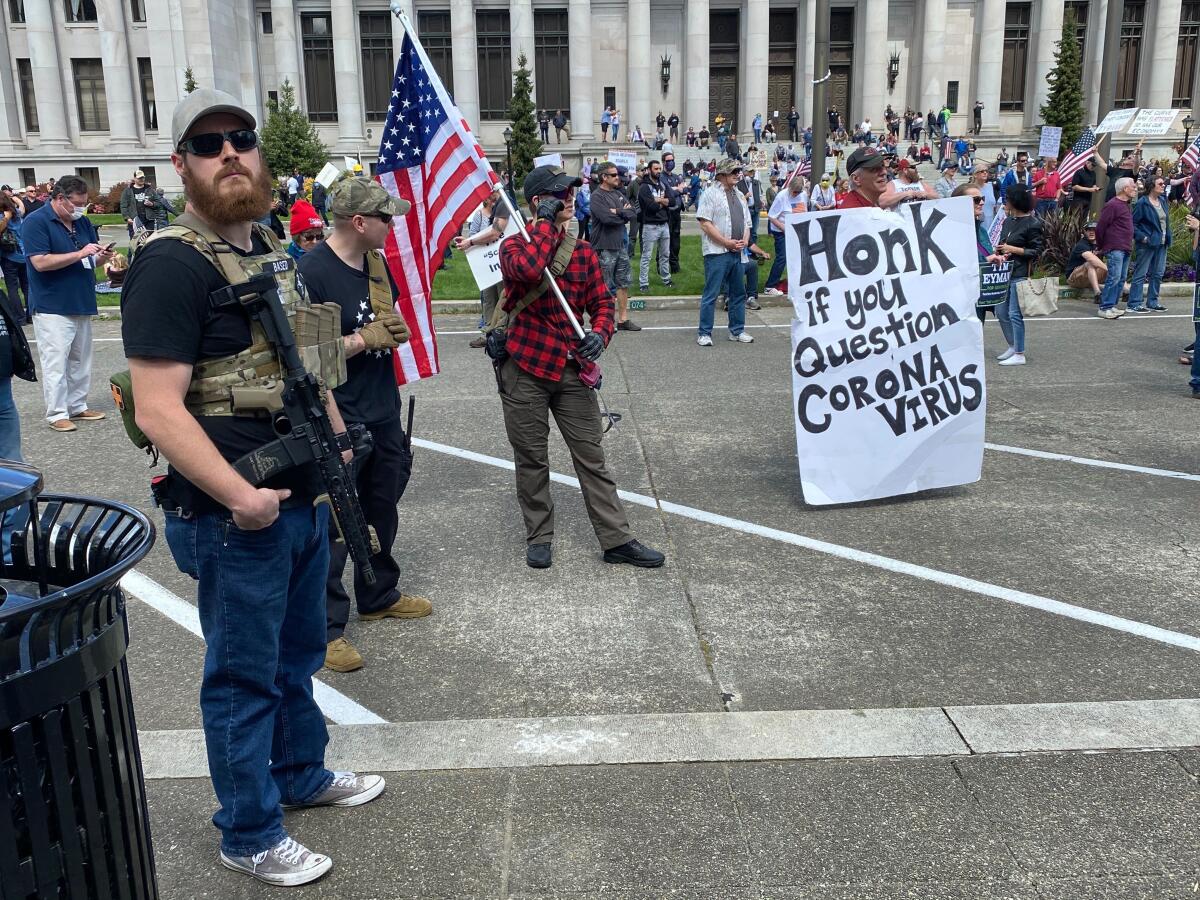
The Washington State Patrol estimated that 2,000 to 2,500 people participated in the demonstration.
Inslee, who unsuccessfully sought the Democratic presidential nomination, said Trump’s encouragement actually endangered those who heeded his words.
“It is dangerous because it can inspire people to ignore things that actually can save their lives,” he said.
More rallies are scheduled in coming days, including one Monday in Bismarck, N.D.
Kaleem reported from Los Angeles, King from Washington, D.C., and Read from Olympia, Wash.
More to Read
Sign up for Essential California
The most important California stories and recommendations in your inbox every morning.
You may occasionally receive promotional content from the Los Angeles Times.
